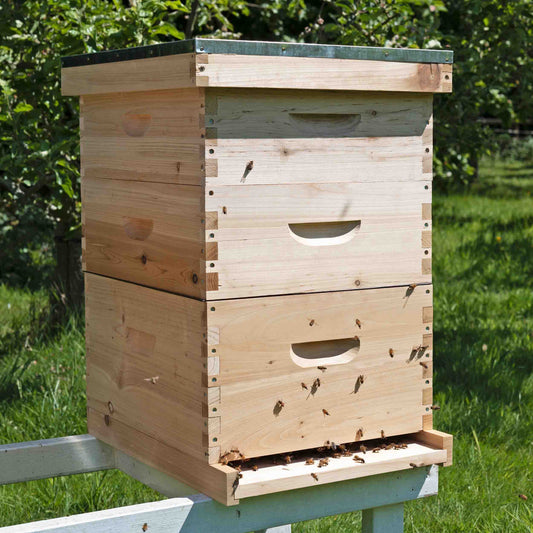
Buckets, bees and battles with verroa
Really chuffed with myself: most of my honey is extracted and sitting in the ubiquitous plastic buckets. I have learned to use the 10-litre ones — anything bigger is just too heavy. I have two lovely stainless buckets that I use to collect the honey from under the extractor; these fill insidiously until eventually they overflow when I am not looking and chuck their contents over the floor, which, of course, cannot be scraped up and recycled.
Fed up with the constant attentiveness required, I built myself a simple alarm to signal when the bucket was full. No! If you want one, build your own. It cost me less than £10 with bits from eBay, but I did have to ask my genius next-door neighbour to do something clever with a transistor to create the right switching signal (that cost a jar of honey).

So, this is the start of the year for bees. They should have made their harvest for the year; you are going to steal it and give them some sugar syrup instead. Meantime, you may or may not want to treat against Varroa. There are lots of potions and magic bullets to treat Varroa, so choose your poison — or theirs.
Have a thought though: we have lived with Varroa for decades, and it is not now the insidious threat it once was. Varroa is a parasite living off bees, but it is totally dependent on its host. If the hive dies, that’s it — curtains for Varroa. It can only survive five days without a bee host. The days of Varroa that parasitised a hive to destruction have gone because those aggressive Varroa died with the hive.
Now we have a type of Mexican standoff, where the Varroa must not win for fear of a Pyrrhic victory and its own demise. So, treat or not as the mood takes you — and if you lose a hive over the winter, don’t blame the poor old Varroa. No arachnid votes for its own demise; it just chose a host that wasn’t up to the task.
Feed your bees now. You have taken their winter food; they only have a short opportunity to take it back. The queen has already reduced her laying, but we need her to have young bees to process syrup into stores and brood the next generation — which we want to be the diutinus bees.
If you are running National hives or similar, you may think that the bees will need extra space beyond a brood box and give them a super to lay up stores. I think it is a good idea, but bear in mind that at some stage the queen excluder will need removing before the winter closes in. You might even want to think about putting the super under the brood chamber at the end of autumn to discourage the queen from laying brood in your super at the start of the spring.
What else must we do? Sometimes wasps can be an issue. Touch wood, I have not had an issue in years, but I do use entrance guards that are easy to close. I reduce all my entrances in the autumn, which deters wasps robbing, and even wax moth ingress.

I don’t unite weak hives. I may unite a hive that has become queenless, but queen-right hives that are not flourishing are presumed to have disease or a viral load and are euthanised. Foundation is burnt, hive and frames scorched and made ready for next year.
Last thought: must order lots of fondant.


